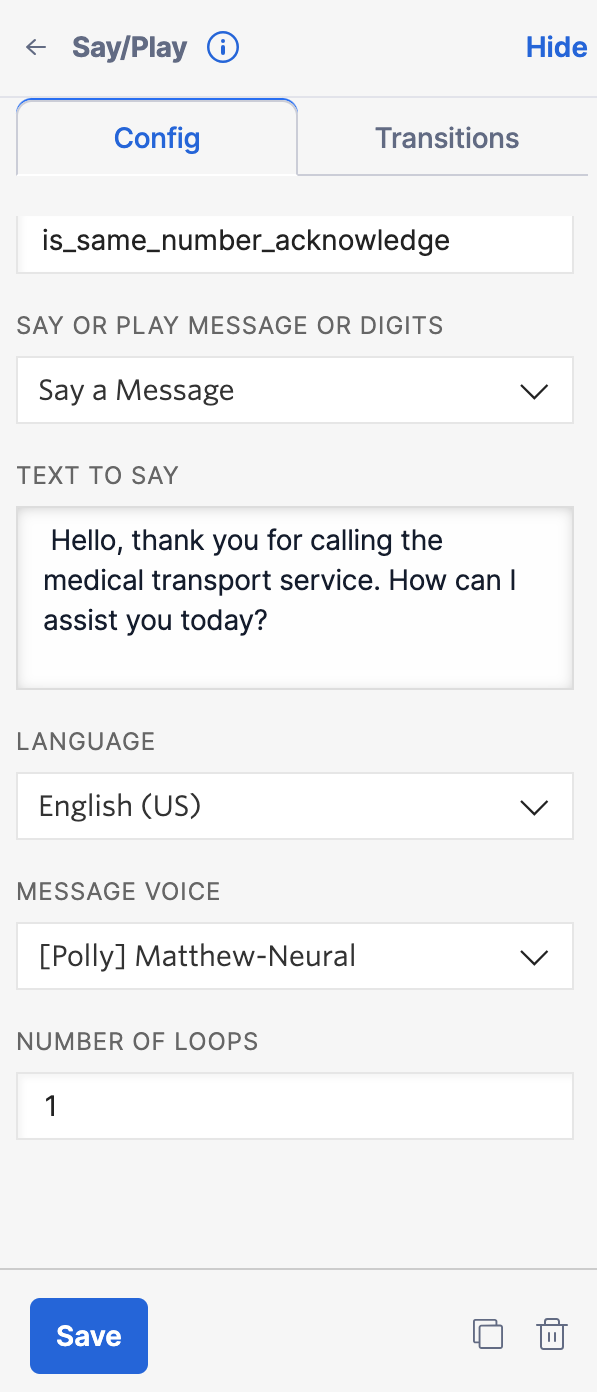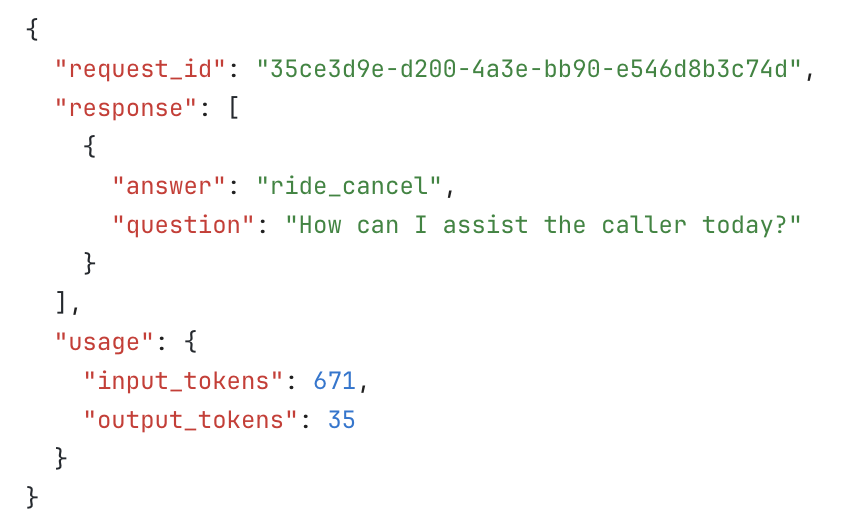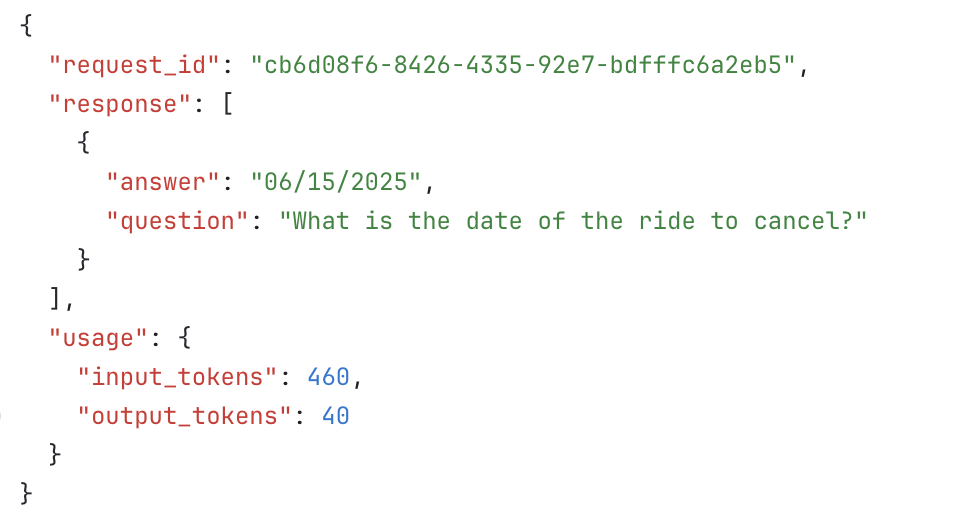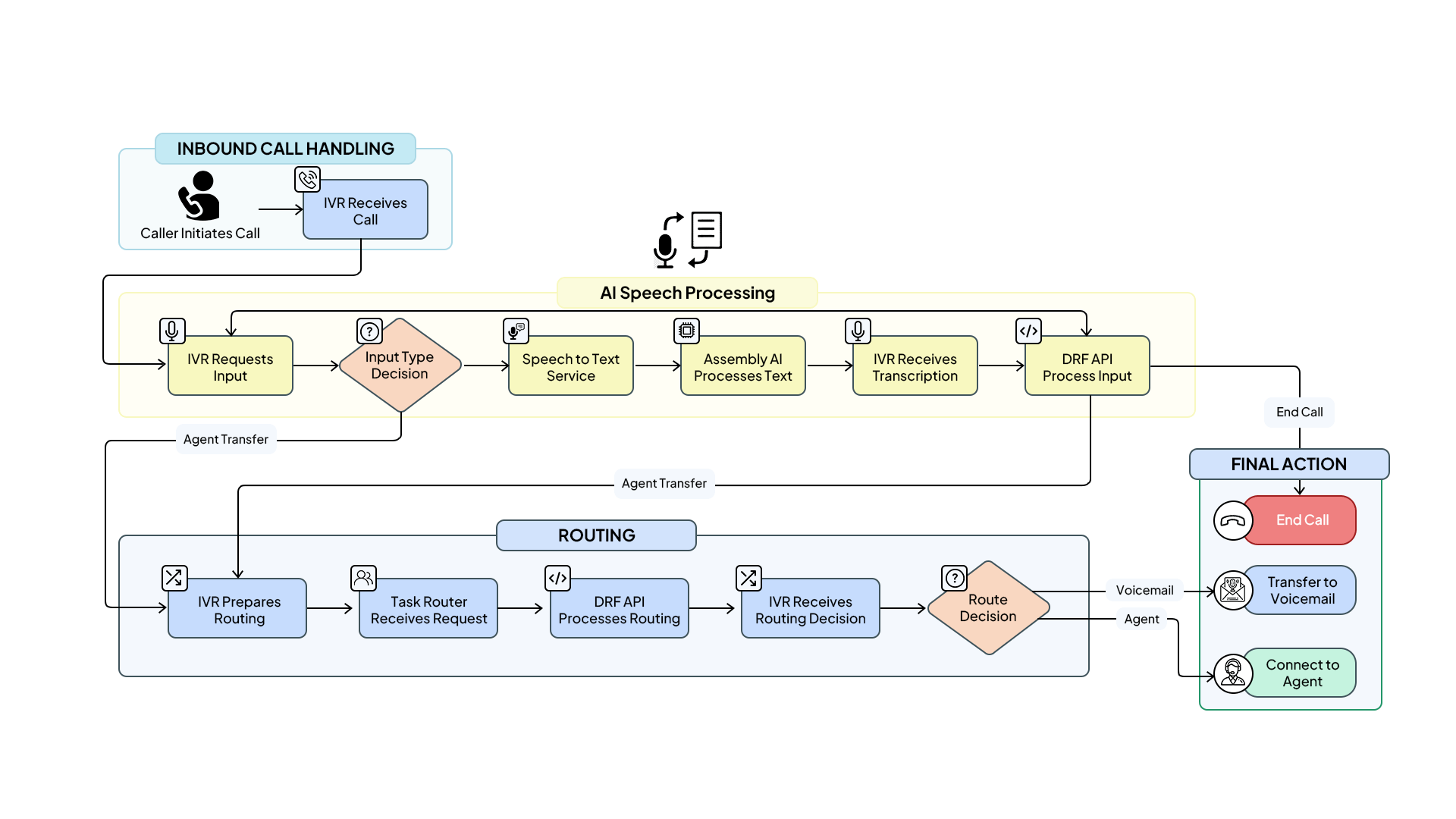Customer Background
US based Healthcare logistics and NEMT (Non-Emergency Medical Transportation) technology platform works to make patient transportation for medical appointments easier. The platform links healthcare providers to transportation providers to simplify ride scheduling, driver assignments and invoice processing while supporting healthcare regulatory and standard compliance.
The customer joined forces with Loginsoft to develop an AI-powered call automation solution which manages growing support requests and transportation coordination calls throughout the day.
Project Goals
The main goal involved creating a voice-controlled AI assistant system to perform automated customer support functions for a Healthcare logistics and NEMT platform. The system needed to refine essential operations including ride cancellations and status checks before moving forward to booking and scheduling capabilities. The solution aimed to provide multilingual support such as English, Spanish to ensure patients from different linguistic backgrounds could communicate easily while keeping privacy and compliance standards across hospital networks.
The project required the development of an internal call management system that would reduce third-party system dependence by providing seamless integration with current ride scheduling and support workflows. The system required hospital-configurable routing options and real-time voice communication and efficient human agent handoffs for immediate situations while keeping operational efficiency and regulatory trust.
The Challenge
The Healthcare logistics and NEMT platform received many patient and provider calls after it expanded its network of hospitals and transportation partners across U.S. The system received calls about ride cancellations, reschedule rides and ride status inquiries which needed fast and precise scalable response solutions. The main challenge involved creating an intelligent voice system which could process real-time speech inputs and manage multilingual interactions while offering flexible features for rescheduling and ride tracking. The system needed to follow hospital protocols on automation versus human support while automatically transferring immediate or complex cases to live agents and keeping consistent service quality for different patient groups and support situations.
- High volume of repetitive customer inquiries (e.g., order status, FAQs).
- Long response times due to limited support staff availability.
- Missed opportunities to engage customers outside business hours.
They needed a scalable, 24/7 solution to improve customer experience while reducing operational costs.
Results
- Loginsoft’s engineering team developed and delivered the AI-Powered Call Automation within three months.
- The automated ride cancellation system decreased caller waiting periods and enhanced operational efficiency.
- This AI system provides 24/7 support, ensuring continuous assistance even during off-hours when human agents may not be available.
- The addition of voice options and language support increased customer satisfaction.
Approach
Speech-to-Text Optimization
The system achieves real-time responsiveness for incoming patient calls through its built-in speech-to-text conversion from Twilio instead of using third-party transcription tools such as Assembly AI. The system achieved better performance through this change because it reduced processing delays. The AI assistant uses Twilio's native capabilities to quickly transcribe patient speech which enables fast downstream processing and provides smooth conversational experiences without any delays or accuracy trade-offs.
Twilio Studio Say/Play Widget Configuration Example:

The Twilio Studio Say/Play widget provides multilingual prompts that aligns with caller’s native language to improve accessibility. The <Gather> widget is set to record voice inputs with background noise tolerance and dual-channel audio to ensure clear speaker separation.
The TaskRouter of Twilio routes calls intelligently through the following criteria:
- Agent language preference
- Support type (e.g., ride scheduling, ride history, accessing the application)
- Agent’s availability.
Emergency calls bypass the IVR system through a specific Studio flow which connects directly to priority agent pools or 24x7 lines.
Intent Recognition with Claude 3.5 Sonnet
The LeMUR Claude 3.5 Sonnet model processes the transcribed request to provide context-based responses for cancellations and rescheduling and status inquiries. The system adjusts its responses according to user preferences to deliver a natural and responsive experience. The system supports multiple predefined intents and processes both direct and conversational queries.
Simplified AI Processing Workflow
The speech-to-text pipeline starts with Twilio’s real-time transcription followed by AI-driven semantic analysis. Text normalization steps include:
- Punctuation and sentence segmentation
- Time and date format (from the date of calling e.g., “Today, day-after tomorrow or next Monday or July 25th”)
The Claude model uses structured prompts with few-short examples to recognize key intents like "Cancel Ride" or "Contact Support," improving understanding even in low-data scenarios.
Example Prompt Structure:
EXAMPLES:
User: " I need to cancel my ride "
Input:

Output:

User: "I need to cancel my ride which is scheduled on June 15th"
Input:

Output:

Backend Integration and Escalation Handling
The AI system delivers structured output having user intent identification and relevant details through secure API connections to the ride management platform. The system enables automatic execution of ride cancellation and rescheduling actions which produce immediate confirmation messages for the caller. The system uses Twilio TaskRouter to hand off calls to human agents when the AI model does not achieve a confidence level above 70% or when it cannot understand the caller's intent.
Workflow Flexibility and Voice Customization
The voice workflow built on Twilio uses both a custom Python SDK and Twilio’s visual flowchart interface to achieve adaptability which allows for faster updates and improvements. The platform allows users to customize voice options including gender and accent and includes IVR flags which enable hospitals to decide whether AI or human agents should answer each call. The system provides flexibility for healthcare providers to adapt the system according to their operational policies and patient communication preferences.
Twilio Workflow & Voice Customization

- The Twilio Studio call flow diagram interface shows a series of interconnected nodes representing different actions and conditions in the flow.
- HTTP requests, variable settings, conditional splits, recordings, message prompts, and task queues are among the things that these include.
- The call flow's logical progression is indicated by lines and arrows in various colors (blue, green, purple) connecting the blocks.
- Key elements include nodes like update_lvr_path, set_var_for_text_response, hold_message, call_recording_off, split_based_on_option, and transfer_to_voice.
- The flow editor menu shows options to zoom, publish, and search, with a 'Change to Flow'.
Multilingual Support and Accessibility
The AI assistant provides support for Spanish language and other languages to serve patients who speak different languages. The multilingual feature of the system provides inclusive communication and improves the user experience by allowing patients to interact in their preferred language.
Integration Architecture and AI Processing
The platform uses Twilio's infrastructure to manage call reception, intelligent routing, and speech transcription. The system uses Twilio Studio, TaskRouter, and Voice API to route calls based on agent availability, time of day, and IVR flags, while providing real-time transcription with version 7.16.0 for improved responsiveness. The system uses multilingual prompts and IVR branching to manage different call scenarios effectively. After transcription, the call data is processed through Assembly AI and analyzed using Claude 3.5 Sonnet for intent recognition, which then triggers the backend workflows.
Ticketing and Agent Support System
The ride management microservices use the intent data from Claude AI to automatically process requests such as bookings or cancellations and generate tickets that are linked to call recordings. All calls and voicemails are stored for agent review, ensuring transparency and accuracy. Agents also receive help from features like a 60-second customizable wrap-up timer, voicemail parsing for actionable data, and an intuitive UI for managing support tickets which streamlines the overall support experience.
Conclusion
The AI-powered call automation system implemented by Loginsoft brought substantial improvements to customer support efficiency and accessibility for a major healthcare Logistics and NEMT technology platform. The solution simplified the management of numerous calls while creating a scalable patient-friendly system that ensured medical transportation security.
The platform now provides a contemporary responsive experience through its combination of real-time voice interaction and natural language understanding with smart ticketing. It supports essential connections between patients and healthcare providers.
Learn how Loginsoft can help you deploy intelligent, industry-specific AI automation to modernize your service platforms. Visit https://www.loginsoft.com for more.








